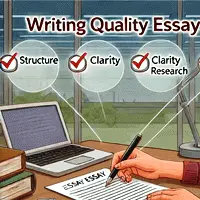 The production of high-quality research papers and assignments is paramount. These scholarly compositions serve as a cornerstone of knowledge dissemination, intellectual exploration, and academic evaluation. However, constructing an impeccable paper that not only adheres to rigorous standards of scholarship but also communicates ideas with utmost clarity and precision can be a tough challenge. This is where the invaluable assistance of our professional research assignments editors comes into play, and at the forefront of this essential support is Research Writing Help.com. We can help with reviewing academic papers, with a commitment to scholars, students, and researchers worldwide. In academic writing, the importance of a well-edited and meticulously reviewed paper cannot be overstated. It is the difference between a work that merely exists and one that excels, leaving a lasting impact on readers, reviewers, and the academic community as a whole. We aim to elevate your academic work to the highest standards of excellence. With a team of seasoned editors and subject matter experts, we stand ready to transform your manuscripts into polished gems of scholarly brilliance. Whether you are a graduate student striving to impress your professors, a researcher looking to publish in prestigious journals, or an academic professional seeking to communicate your ideas effectively, our editing services are tailored to meet your unique needs. Our commitment to helping you with reviewing academic papers extends far beyond mere proofreading and grammar correction. We delve deep into the heart of your work, scrutinizing every sentence for clarity, coherence, and academic rigor. We ensure that your arguments are sound, your citations are accurate, and your writing style is both engaging and authoritative. Moreover, we pay meticulous attention to formatting, adhering to the specific guidelines and citation styles required by your institution or journal of choice. In an era where the competition in academia is fiercer than ever, the value of having a professional touch on your academic papers cannot be underestimated. We can guide you on the journey to academic excellence. With our expertise, dedication, and unwavering commitment to enhancing the quality of your work, we ensure that your ideas shine brightly and leave an indelible mark in the world of scholarship. Your papers can reach their fullest potential with our editing support. Your success is our success, and together, we can ascend the peaks of scholarly achievement.
The production of high-quality research papers and assignments is paramount. These scholarly compositions serve as a cornerstone of knowledge dissemination, intellectual exploration, and academic evaluation. However, constructing an impeccable paper that not only adheres to rigorous standards of scholarship but also communicates ideas with utmost clarity and precision can be a tough challenge. This is where the invaluable assistance of our professional research assignments editors comes into play, and at the forefront of this essential support is Research Writing Help.com. We can help with reviewing academic papers, with a commitment to scholars, students, and researchers worldwide. In academic writing, the importance of a well-edited and meticulously reviewed paper cannot be overstated. It is the difference between a work that merely exists and one that excels, leaving a lasting impact on readers, reviewers, and the academic community as a whole. We aim to elevate your academic work to the highest standards of excellence. With a team of seasoned editors and subject matter experts, we stand ready to transform your manuscripts into polished gems of scholarly brilliance. Whether you are a graduate student striving to impress your professors, a researcher looking to publish in prestigious journals, or an academic professional seeking to communicate your ideas effectively, our editing services are tailored to meet your unique needs. Our commitment to helping you with reviewing academic papers extends far beyond mere proofreading and grammar correction. We delve deep into the heart of your work, scrutinizing every sentence for clarity, coherence, and academic rigor. We ensure that your arguments are sound, your citations are accurate, and your writing style is both engaging and authoritative. Moreover, we pay meticulous attention to formatting, adhering to the specific guidelines and citation styles required by your institution or journal of choice. In an era where the competition in academia is fiercer than ever, the value of having a professional touch on your academic papers cannot be underestimated. We can guide you on the journey to academic excellence. With our expertise, dedication, and unwavering commitment to enhancing the quality of your work, we ensure that your ideas shine brightly and leave an indelible mark in the world of scholarship. Your papers can reach their fullest potential with our editing support. Your success is our success, and together, we can ascend the peaks of scholarly achievement.
Should a completed academic paper be edited before submission? Why?
Yes, a completed academic paper should always be edited before submission. Editing ensures clarity and coherence in your writing. It allows you to review your arguments, structure, and organization to ensure that your paper flows logically and effectively conveys your ideas to the reader. More so, editing helps eliminate grammatical and spelling errors, which can distract readers and undermine the credibility of your work. Correcting these errors demonstrates your attention to detail and professionalism. Keep in mind that editing allows you to refine your writing style and tone to align with the expectations of your academic audience. It helps you maintain a consistent voice throughout the paper, making it more engaging and persuasive. Furthermore, editing gives you the opportunity to check and properly format citations and references, ensuring that your paper adheres to the specific citation style required by your institution or journal. Fundamentally, editing is an essential step in the academic writing process as it enhances the overall quality and effectiveness of your paper, making it more readable, credible, and persuasive. It reflects your commitment to producing high-quality scholarly work and increases your chances of success in the academic world.
What should students look out for when editing their research papers?
When editing their research papers, students should pay careful attention to several key aspects to ensure clarity, accuracy, and coherence in their work. These are are;
- Overall Structure: Check if the paper follows a logical and well-organized structure. Ensure that the introduction presents the research question, the body provides evidence and analysis, and the conclusion summarizes findings and implications.
- Thesis Statement: Ensure that the thesis statement is clear and aligns with the paper's content. Revise it if necessary to accurately reflect the research.
- Simplicity and Conciseness: Eliminate wordiness and ambiguity. Use clear and concise language to convey ideas effectively.
- Sentence Structure and Syntax: Proofread for grammatical errors, punctuation, and sentence structure. Consistent tense and voice are essential.
- Citations and References: Verify that all sources are properly cited within the text and listed in the bibliography or reference section according to the required citation style (e.g., APA, MLA).
- Evidence and Support: Evaluate the quality and relevance of the evidence and examples used to support arguments. Ensure they align with the thesis and research question.
- Coherence and Transitions: Ensure smooth transitions between paragraphs and sections. Use connecting words and phrases to guide the reader through the paper.
- Audience Awareness: Consider the intended audience and adjust the tone and style accordingly. Ensure that complex concepts are explained for a non-specialist reader if necessary.
- Consistency: Maintain consistency in formatting, font, and style throughout the paper. Follow any specific formatting guidelines provided by the instructor.
- Plagiarism: Verify that all sources are properly attributed and that the paper is free from any unintentional plagiarism.
What difference can our editors make in an academic paper compared to self-editing?
Our professional editors can significantly enhance the quality and impact of an academic paper compared to self-editing. They utilize their expertise to provide academic paper editing help, as they approach your work with a fresh, unbiased eye. They can identify inconsistencies, ambiguities, and errors that you might overlook due to your familiarity with the content. Also, our experts ensure that your paper is well-structured and logically organized. They can rephrase awkward sentences, improving overall readability and ensuring that your ideas flow smoothly. They are well-versed in grammar and citation styles (e.g., APA, MLA), guaranteeing that your paper adheres to academic standards. They correct grammar, punctuation, and formatting issues. Our editors equally help trim unnecessary content, ensuring your paper is concise and focused on its main arguments. This makes your work more compelling and easier for readers to grasp. Our experts may suggest ways to bolster your arguments, find supporting evidence, or clarify concepts, thereby improving the substance of your paper. We can also help you avoid unintentional plagiarism by ensuring proper citation and referencing. Additionally, our editors are familiar with submission guidelines for academic journals and conferences. They can help tailor your paper to meet these requirements, increasing your chances of acceptance.
 Our experts play a crucial role in enhancing the quality and effectiveness of scholarly work. As a student striving for higher grades or a researcher aiming for publication, the assistance of our skilled editors can significantly improve your assignments and research papers. The process of editing goes beyond mere proofreading. It involves a thorough review of the content, structure, clarity, coherence, and adherence to academic conventions. We are well-versed in the nuances of different citation styles (APA, MLA, Chicago, etc.) and we can ensure that your references are accurate and properly formatted. One of the primary benefits of seeking our editing help is the elimination of grammatical errors, spelling mistakes, and typographical errors. These seemingly minor issues can have a substantial impact on the overall impression of your work and the evaluation it receives. Our editors can also help you refine your writing style, making it more concise, coherent, and engaging for your target audience. We can help to identify areas where arguments may be weak or unclear and offer guidance on how to strengthen them. This guidance not only improves the quality of your current assignment but also enhances your writing skills for future endeavors. In the competitive world of academia, where precision and clarity are paramount, seeking our best assignment-improving services is a wise investment. It can lead to higher grades, increased chances of publication, and the development of strong writing skills that will serve you well throughout your academic and professional career.
Our experts play a crucial role in enhancing the quality and effectiveness of scholarly work. As a student striving for higher grades or a researcher aiming for publication, the assistance of our skilled editors can significantly improve your assignments and research papers. The process of editing goes beyond mere proofreading. It involves a thorough review of the content, structure, clarity, coherence, and adherence to academic conventions. We are well-versed in the nuances of different citation styles (APA, MLA, Chicago, etc.) and we can ensure that your references are accurate and properly formatted. One of the primary benefits of seeking our editing help is the elimination of grammatical errors, spelling mistakes, and typographical errors. These seemingly minor issues can have a substantial impact on the overall impression of your work and the evaluation it receives. Our editors can also help you refine your writing style, making it more concise, coherent, and engaging for your target audience. We can help to identify areas where arguments may be weak or unclear and offer guidance on how to strengthen them. This guidance not only improves the quality of your current assignment but also enhances your writing skills for future endeavors. In the competitive world of academia, where precision and clarity are paramount, seeking our best assignment-improving services is a wise investment. It can lead to higher grades, increased chances of publication, and the development of strong writing skills that will serve you well throughout your academic and professional career.
Best Way to Edit an Academic Assignment | Custom Paper Refinement
The process of writing a winning academic assignment is a challenging and time-consuming endeavor. From conducting in-depth research to formulating cogent arguments, students and scholars invest significant effort into producing a well-structured and coherent paper that reflects their knowledge and expertise on a particular subject. However, the journey toward academic excellence doesn't end with the completion of the initial draft. It is in the process of editing and refinement that a paper truly shines and reaches its full potential. In this pursuit of academic perfection, the importance of expert research paper editing guidance is unquestionable. Editing an academic assignment goes beyond mere proofreading for grammar and spelling errors; it involves a meticulous examination of the content, organization, clarity, and overall coherence of the paper. Whether you are a student striving for a high grade or a researcher aiming for publication in a prestigious journal, the quality of your writing plays a pivotal role in achieving your academic goals. This is where our professional paper editing services come into play, offering a lifeline to those seeking to enhance the quality and impact of their work. We understand the paramount importance of refining academic assignments to meet the highest standards. Our team of seasoned editors, with their extensive experience across various disciplines, is dedicated to providing you with the best possible guidance to elevate your research paper to its zenith. We take pride in our ability to offer expert guidance that not only rectifies errors but also enhances the overall quality of your work. Our approach to academic paper refinement is rooted in a commitment to precision and excellence. We delve deep into the core of your paper, scrutinizing every element, from the thesis statement to the conclusion, ensuring logical flow, coherence, and consistency throughout. We pay meticulous attention to the accuracy of citations and references, ensuring that your work adheres to the highest academic standards and guidelines. In addition to refining the structural and organizational aspects of your paper, our expert editors are well-versed in the nuances of language and style. They meticulously analyze sentence structure, word choice, and overall writing style to ensure that your paper not only communicates your ideas effectively but also does so with eloquence and clarity. We stand as your trusted partner on the journey to academic excellence. With our commitment to precision, expertise in various academic disciplines, and dedication to enhancing the quality of your research paper, we are here to guide you.
What can make you realize that your assignment requires editing?
Realizing that your assignment requires editing is a crucial step in producing high-quality work. Several indicators can help you recognize when editing is necessary:
- Grammatical Errors: Frequent grammar mistakes such as incorrect verb tense, subject-verb agreement issues, or punctuation errors can signal the need for editing.
- Spelling Mistakes: Misspelled words, typos, or homophone confusion (e.g., "their" vs. "there") are clear signs that editing is required.
- Lack of Precision and Coherence: If your assignment lacks clarity, has disjointed paragraphs, or lacks a logical flow of ideas, editing can help improve overall coherence.
- Redundancy and Wordiness: Overly repetitive phrases, unnecessary words, or long-winded sentences can benefit from editing to streamline and enhance readability.
- Discrepancy: Check for consistent formatting, citation style, and the use of terminology throughout your assignment.
- Content inaccuracy: Ensure that the facts, data, and information presented in your assignment are accurate and properly cited.
- Poor organization: Evaluate the overall structure of your assignment, including the introduction, body, and conclusion, to ensure it effectively communicates your main points.
How should you professionally edit an academic paper step by step?
Editing an academic paper professionally requires a systematic approach to ensure clarity, coherence, and accuracy. This is the best way to edit an academic assignment:
- Familiarize yourself with the specific guidelines and formatting requirements of the target journal or institution. This includes citation styles, page limits, and any specific instructions.
- Start with a high-level review of the paper's structure. Ensure it has a clear introduction, well-organized sections, logical flow, and a strong conclusion. Check for proper headings and subheadings.
- Focus on sentence and paragraph-level clarity. Eliminate jargon, ambiguity, and overly complex language. Ensure each paragraph flows logically from the previous one.
- Check for grammatical errors, punctuation, and consistency in writing style. Pay attention to tense, voice, and word choice.
- Verify that all citations are correctly formatted and match the references in the bibliography. Ensure adherence to the chosen citation style (e.g., APA, MLA, Chicago).
- Verify the accuracy of any data, charts, tables, or figures presented in the paper. Ensure proper labeling and alignment with the text.
- Eliminate unnecessary words or redundancy to make the paper more concise without sacrificing clarity.
- Use plagiarism detection tools to ensure the paper does not contain any unattributed content from other sources.
- Carefully proofread the paper for typos, spelling errors, and formatting inconsistencies.
- Conduct a final review to ensure that all changes are incorporated correctly and that the paper meets all submission requirements.
- Make sure the paper adheres to the required formatting guidelines for fonts, margins, and spacing.
- Double-check the title, abstract, keywords, and author information for accuracy.
- Prepare the paper for submission, following the submission guidelines of the target journal or institution.
What are the features of a refined research assignment?
A refined research assignment exhibits key features that distinguish it as a well-crafted and effective task for students or researchers. It should have a clear and specific research question or problem statement that serves as the focal point of the inquiry. This question should be framed in a way that encourages critical thinking and exploration, allowing for multiple perspectives and potential answers. Additionally, a refined research assignment should provide clear guidelines and expectations regarding the scope and format of the research. This includes specifying the required length, formatting style (e.g., APA, MLA), and any particular sources or types of evidence that should be consulted. Clarity in these instructions helps students or researchers understand what is expected of them and ensures consistency in the evaluation process. Furthermore, a well-structured research assignment includes a timeline or deadlines for various stages of the research process, such as selecting a topic, conducting literature reviews, gathering data, and writing drafts. These milestones help students manage their time effectively and prevent last-minute rushes. A refined research assignment also encourages independent inquiry and critical thinking by requiring students or researchers to engage with a variety of sources, analyze evidence, and develop well-reasoned arguments or conclusions. It may also prompt them to consider ethical considerations, methodologies, and potential biases related to their research topic. Relevantly, effective research assignments should promote effective communication skills, both written and oral. They may require students to present their findings through written reports, presentations, or other forms of dissemination. This encourages the development of communication and presentation skills that are valuable in academia and various professional settings. In a nutshell, a refined research assignment should have a clear research question, well-defined guidelines, a structured timeline, opportunities for critical thinking and independent inquiry, and a focus on communication skills. These features collectively contribute to a meaningful and productive research experience for students or researchers.
 Refining an assignment is a crucial step in the writing process, and there are several effective strategies that can be employed to ensure the best possible outcome. Custom research paper refinement requires attention to detail, dedication, and a commitment to excellence. With our guidance, students and scholars can significantly enhance the quality of their work and achieve higher academic success. It is essential to start the editing process with a fresh perspective. Taking a break from the paper before editing allows for a more objective review of the content and helps in identifying errors and areas for improvement. Additionally, seeking feedback from peers or professors can provide valuable insights and different viewpoints, ultimately leading to a more well-rounded and polished assignment. Another vital aspect of refinement is thorough proofreading. Paying close attention to grammar, spelling, punctuation, and formatting is essential to maintain professionalism in academic writing. Utilizing spell-check and grammar-check tools can be beneficial, but they should not replace careful manual proofreading, as they may not catch context-specific errors. Furthermore, organizing and structuring the paper logically is key to ensuring clarity and coherence. Reviewing the overall flow of the paper, the strength of arguments, and the relevance of supporting evidence can significantly enhance the paper's overall quality. Our custom services are an indispensable step in academic writing. It demands patience, attention, and a commitment to excellence. By incorporating the strategies discussed in this article, writers can significantly improve their academic assignments and present their ideas more effectively. Ultimately, the pursuit of academic excellence requires dedication not only in the initial writing process but also in the meticulous editing and refinement stages.
Refining an assignment is a crucial step in the writing process, and there are several effective strategies that can be employed to ensure the best possible outcome. Custom research paper refinement requires attention to detail, dedication, and a commitment to excellence. With our guidance, students and scholars can significantly enhance the quality of their work and achieve higher academic success. It is essential to start the editing process with a fresh perspective. Taking a break from the paper before editing allows for a more objective review of the content and helps in identifying errors and areas for improvement. Additionally, seeking feedback from peers or professors can provide valuable insights and different viewpoints, ultimately leading to a more well-rounded and polished assignment. Another vital aspect of refinement is thorough proofreading. Paying close attention to grammar, spelling, punctuation, and formatting is essential to maintain professionalism in academic writing. Utilizing spell-check and grammar-check tools can be beneficial, but they should not replace careful manual proofreading, as they may not catch context-specific errors. Furthermore, organizing and structuring the paper logically is key to ensuring clarity and coherence. Reviewing the overall flow of the paper, the strength of arguments, and the relevance of supporting evidence can significantly enhance the paper's overall quality. Our custom services are an indispensable step in academic writing. It demands patience, attention, and a commitment to excellence. By incorporating the strategies discussed in this article, writers can significantly improve their academic assignments and present their ideas more effectively. Ultimately, the pursuit of academic excellence requires dedication not only in the initial writing process but also in the meticulous editing and refinement stages.








